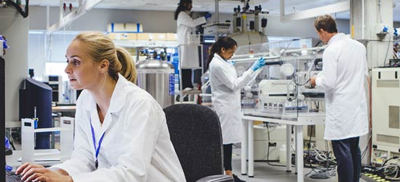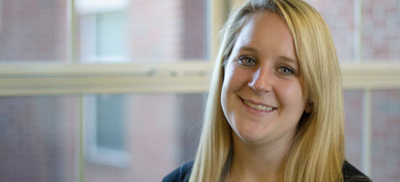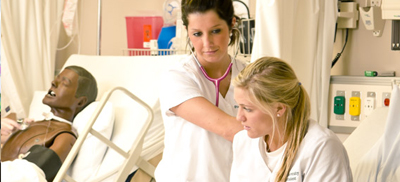Audrey Buchanan wanted to make an impact on healthcare, but it took some time for her to find the right fit. After graduating from Stevenson University with her bachelor’s degree in Human Services, Audrey became interested in quality management and patient safety sector of the healthcare industry. The School of Graduate and Professional Studies Healthcare Management program enabled her transition into a new role.
Why did you choose to pursue your master’s in Healthcare Management?
I have always had an interest in healthcare; however, I realized through several counseling internships that direct clinical care was not for me. I still wanted to work in healthcare and provide people with quality care, so I chose to pursue my master’s degree in Healthcare Management at Stevenson University. The degree allows me to work to improve care for those in need, but from a different perspective.
How did this degree prepare you for your career?
This degree provided me with the concepts, knowledge, and foundation to enter into the healthcare field. The resources (textbooks, case studies, etc.) were related to real world scenarios, personal experiences of the faculty, and relative management tools. Further, this program is taught by leaders who have worked in the field and can provide insight and feedback as academic advisors and healthcare professionals.
The healthcare industry is continuously changing, so a healthcare professional must also evolve. This program enhanced my understanding of what it means to be a leader in healthcare as the field changes into a more accessible and comprehensive system. Ultimately, this program allowed me to develop my skills and emerge as a professional in this industry.
What are some examples of how the coursework you completed immediately applied to your job?
After graduating, there have been many times where colleagues referenced a technique or process that I was already familiar with, thanks to my coursework and capstone requirements; it is extremely reassuring to have an understanding of what is being discussed. For example, we learned about process improvement with the use of the Plan-Do-Check-Act (PDCA) technique throughout the program. In my current position as Senior Quality Data Analyst, one of my roles is to communicate with executives and healthcare providers to facilitate PDCA’s mission to promote change.
How did the faculty and staff help you reach your education or career goals?
I cannot say enough about the faculty and staff of the program. Each was receptive, engaged, and responsive. The faculty went out of their way to help students if there were questions or concerns, and they did so timely and thoroughly. Many of the faculty and staff have worked in healthcare and were able to have open, relatable discussions with students.
What is the most important lesson you learned from your experience at Stevenson?
Healthcare is constantly changing, even more so now with new guidelines and regulations; therefore, it is crucial that healthcare professionals also evolve. Stevenson taught me to that learning will continue after graduation and the possibilities are endless if you network with others and engage in professional development activities.
How has your career impacted your life and lives of other?
After I graduated, I was offered a position at a Baltimore area hospital that had a large focus on improving the access and availability of care for geriatric patients. My role as the Program Administrator involves working alongside the Chief of the Division and other executives to expand and improve patient care. One of our goals was to reduce the risk of readmission for high risk patients, keep them out of the hospital, and maintain or improve their quality of life. We developed a system and structure in the practice that would identify the high risk patients, who were often the sickest patients or the patients who had very limited resources or support, and we would review their case to determine needed resources. Once we determined the needed resources, we would work diligently to provide those resources or educate patients of those resources. Navigating the healthcare system for an elderly patient can be taxing and frustrating; it was our responsibility to help them navigate any obstacles and make the continuum of care seamless. It was truly rewarding to help patients and their families ease the burden and stress.






